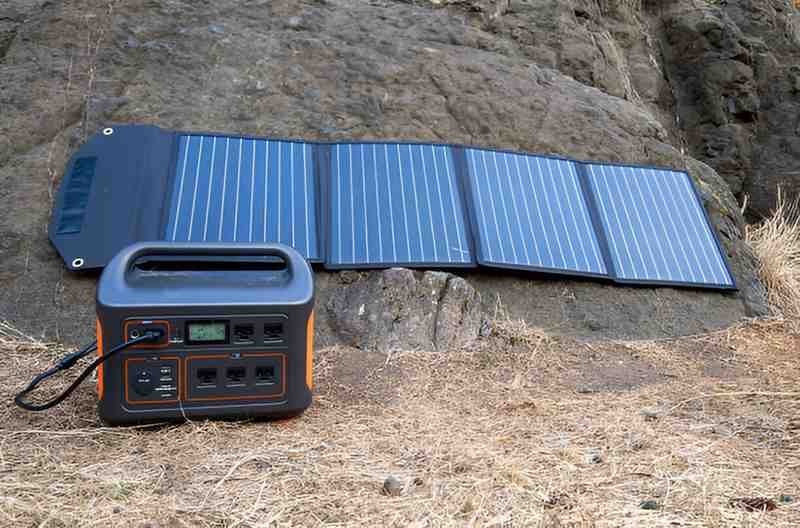Portable solar generators have become a go-to solution for people seeking sustainable, off-grid energy. Whether you’re camping, RVing, or facing an unexpected power outage, a reliable solar generator can provide peace of mind. In this comprehensive buying guide, I’ll walk you through the features, benefits, and best options for portable solar generators, helping you make an informed decision based on your unique needs.
Table of Contents
What is a Portable Solar Generator?
A portable solar generator combines a solar panel and battery system in a compact, transportable form. It allows you to harness solar energy and store it for later use, offering an eco-friendly solution for off-grid living or backup power during emergencies. Unlike conventional gas-powered generators, solar generators don’t rely on fuel, making them quieter, cleaner, and more efficient.
Why Choose a Portable Solar Generator?
The main reason people choose portable solar generators is their convenience and sustainability. Here are some reasons why they might be the right choice for you:
- Eco-friendly: They use renewable energy, reducing your carbon footprint.
- Low Maintenance: Solar generators don’t require fuel or frequent maintenance like gas generators.
- Quiet Operation: Unlike traditional generators, they operate quietly, ensuring minimal disturbance.
- Versatility: They can power a range of devices from small electronics to larger appliances.
- Portable: You can take them anywhere, making them ideal for outdoor activities or emergency situations.
Key Features to Consider When Choosing a Solar Generator
Before making your decision, there are several factors to weigh:
1. Power Output and Capacity
The power output of a solar generator is one of the most important considerations. It determines what devices or appliances it can power and for how long. Solar generators typically use watt-hours (Wh) to describe their storage capacity. Higher capacity equals more energy storage, which means you can power larger devices or run them for longer.
2. Solar Panel Efficiency
The efficiency of the solar panel affects how quickly the generator recharges. More efficient panels convert more sunlight into usable energy. Ideally, you want a generator with solar panels that are capable of recharging the unit relatively quickly, especially if you plan on using it for extended periods in the outdoors.
3. Portability
Since you’re looking for a portable solar generator, its weight and size will matter. Some models are designed for heavy-duty use with larger capacities, while others are smaller and lightweight, suitable for camping or small appliances. If you need to carry it over long distances, portability becomes crucial.
4. Battery Type
The battery type determines how long the generator holds its charge. Lithium-ion batteries are the most common in modern solar generators due to their longevity and efficiency. However, some cheaper models may use lead-acid batteries, which have shorter lifespans and lower efficiency.
5. Output Ports
The types and number of output ports matter depending on what you plan to power. Many portable solar generators come with AC outlets, DC carports, and USB ports. Consider what devices you’ll need to charge and ensure the generator has the necessary ports.
6. Recharge Time
The time it takes for the solar generator to recharge fully is another important factor. If you’re using it regularly, you’ll want a generator that can recharge quickly. Some generators allow recharging via solar panels, a wall outlet, or even a car, giving you flexibility in how you replenish the battery.
7. Durability
Durability is key for outdoor use. Solar generators should be built to withstand harsh weather, bumps, and the rigors of transportation. Look for models with sturdy cases, waterproofing, and rugged designs if you’re going to use it in tough conditions.
8. Price
Solar generators can vary significantly in price, from budget-friendly models to high-end systems with advanced features. While it’s tempting to go for the cheapest option, balance the cost with the quality and features that match your needs.
Comparison of the Best Portable Solar Generators
Now, let’s dive into some of the best portable solar generators on the market, based on my own research and evaluation. The table below highlights key specifications of top models.
| Solar Generator | Power Capacity | Solar Panel Efficiency | Battery Type | Recharge Time | Weight | Output Ports | Price |
|---|---|---|---|---|---|---|---|
| Jackery Explorer 1000 | 1002Wh | 23% | Lithium-ion | 7-8 hours (via wall) | 22 lbs | 3 AC, 2 USB-A, 1 USB-C, DC carport | $999 |
| Goal Zero Yeti 1500X | 1516Wh | 15-20% | Lithium-ion | 14-16 hours (via solar) | 45.6 lbs | 2 AC, 4 USB-A, 1 USB-C, 12V carport | $1799 |
| Bluetti AC200P | 2000Wh | 20% | Lithium-ion | 8-12 hours (via solar) | 60.6 lbs | 6 AC, 4 USB-A, 1 USB-C, 1 carport | $1399 |
| EcoFlow Delta 1300 | 1260Wh | 23% | Lithium-ion | 1 hour (via wall) | 30.9 lbs | 4 AC, 2 USB-A, 1 USB-C, carport | $1299 |
| Rockpals 300W | 280Wh | 18% | Lithium-ion | 5-6 hours (via wall) | 7.5 lbs | 2 AC, 3 USB-A, carport | $289 |
Best for Portability: Rockpals 300W
If portability is a top priority for you, the Rockpals 300W is an excellent choice. Weighing just 7.5 pounds, it’s one of the lightest solar generators available while still offering a decent power capacity of 280Wh. It’s perfect for smaller appliances, electronics, and outdoor activities like camping. However, the trade-off is its lower power capacity compared to larger models, so it’s not suitable for powering larger appliances like fridges for long periods.
Best for Large Capacity: Bluetti AC200P
For those who need a generator capable of powering a wide range of devices, including larger appliances, the Bluetti AC200P is a powerhouse. With a massive 2000Wh capacity and multiple output ports, it can easily handle everything from refrigerators to power tools. While it’s heavier and more expensive than smaller models, the AC200P’s versatility makes it a great choice for off-grid living or extended power outages.
Best for Quick Recharging: EcoFlow Delta 1300
One standout feature of the EcoFlow Delta 1300 is its incredibly fast recharge time. It can be fully charged in just 1 hour via a wall outlet, which is ideal for those who need power quickly. This solar generator is a great balance between power and portability, offering a 1260Wh capacity and enough ports to charge multiple devices simultaneously.
How to Choose the Right Solar Generator for Your Needs
Choosing the right solar generator depends on how you plan to use it. Here are some considerations to help you narrow down your options:
1. Power Needs
Consider how much power you require. If you’re powering small devices like phones, laptops, or lights, a smaller model like the Rockpals 300W will suffice. For larger devices like refrigerators, power tools, or medical equipment, opt for a model with a larger battery capacity, such as the Bluetti AC200P.
2. Usage Location
If you’re camping or traveling, portability becomes a key factor. Look for lightweight models like the Jackery Explorer 1000 or Rockpals 300W. On the other hand, if you’re using it as backup power at home, the Goal Zero Yeti 1500X or Bluetti AC200P might be better suited to your needs.
3. Recharging Speed
If you’re likely to need a quick recharge, the EcoFlow Delta 1300 stands out with its rapid wall outlet recharge time. For off-grid living, where recharging might take longer, a model like the Goal Zero Yeti 1500X with a large battery capacity and the ability to use multiple solar panels for faster recharge is ideal.
4. Durability and Weather Resistance
If you plan to use your solar generator in harsh weather conditions, look for rugged models with weatherproof designs. The Goal Zero Yeti series and Bluetti AC200P are both built to withstand outdoor elements.
Conclusion
Portable solar generators are invaluable tools for providing backup power and supporting sustainable energy practices. Choosing the right one involves balancing power, portability, recharge time, and cost. Based on your needs, whether you’re looking for a lightweight unit for camping or a robust system for home backup, there’s a solar generator that fits your lifestyle. Take the time to evaluate your power needs, preferred features, and budget to find the best solar generator for you.
With the growing availability of solar generators, there’s no better time to invest in one. The benefits of using clean, renewable energy while being prepared for emergencies or outdoor adventures are clear. Happy solar hunting!





